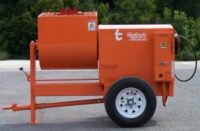 The Texas Aggregates & Concrete Association (TACA) – the leading state trade association for the aggregate, concrete, cement and associated industries – welcomed 120 attendees to its annual Environmental, Sustainability & Safety Seminar on Oct. 24-25 at the Plaza San Antonio Hotel & Spa in San Antonio, Texas.
The Texas Aggregates & Concrete Association (TACA) – the leading state trade association for the aggregate, concrete, cement and associated industries – welcomed 120 attendees to its annual Environmental, Sustainability & Safety Seminar on Oct. 24-25 at the Plaza San Antonio Hotel & Spa in San Antonio, Texas.
Attendees heard from industry experts about a variety of issues, including Environmental Product Declarations; drug testing trends; new driver, safety and camera technologies; structural engineering sustainability; conservation opportunities; heat illness prevention; new silica standards; slag concrete; and working relationships between concrete delivery and the concrete pump industry. In addition, participants learned about new air quality standards from a panel of three experts.
On Feb. 7, 2024, the U.S. Environmental Protection Agency (EPA) issued a final rule under the Clean Air Act lowering the annual National Ambient Air Quality Standard (NAAQS) for fine particulate matter 2.5 micrometers in diameter or smaller (PM2.5) from 12 to 9 micrograms per cubic meter (μg/m3). The aggregate industry is required to comply with the new standards, while continuing to provide the critical infrastructure materials to build the roads, bridges, schools, buildings, homes and hospitals needed at a time of unprecedented growth. These come with additional costs and considerations, as an estimated 1,300 people move to Texas every day.
“There is no doubt that the final rule will have far-reaching effects on the industry and beyond,” said Melissa Fitts, Senior Vice President, Permitting & Compliance, Westward Environmental. “For operators, there is a high probability that the new PM2.5 standard could mean such things as bigger property line distances, limited production, enclosures and reduced stockpiles.” In some cases, she said, “these are things the industry is already doing.”
Shawn Haven, Senior Project Manager, EnSafe, Inc., advised that operators can stay under Significant Impact Levels (SIL) – which is considered the de minimis level for PM2.5 particles – by performing an air dispersion modeling analysis that evaluates the potential off-site PM2.5 impacts to human health and the environment. The analysis takes multiple factors into consideration, including emission source types, production rates and emissions control techniques, to evaluate if the project can stay under overall SIL levels to avoid a more comprehensive modeling analysis. “Most importantly,” he said, “operators will need to focus on actual expected production numbers.”
Douglas Wolf, Director, Air Quality Services, Groundwater & Environmental Services, Inc., advised that “wind barriers can be highly effective in reducing downwind speeds by more than 50 percent, resulting in reduced PM2.5 concentrations by 60 percent. Wind screening can also be helpful from an aesthetic standpoint when nearby residential developments build next to sites,” he said.
Elliot Townsend, Director, Environmental Compliance Services, Raba Kistner, moderated the panel, which took place on Thursday, Oct. 24.
Later in the afternoon, participants heard from Bonnie Evridge, Mechanical Coatings Section Manager, Air Permits Division, Texas Commission on Environmental Quality (TCEQ), about how the agency is evaluating the new federal air quality standard, which became effective on May 6, and how it may affect permitting for the Texas aggregate, concrete and cement industries.
“We are thrilled that TACA is able to offer the Environmental, Sustainability & Safety Seminar each year to its members,” said TACA President and CEO Zak Covar. “For two days, we bring together subject-matter experts on a wide variety of issues. Members spend two full days learning from our speakers, and each other, as well as enjoying networking activities – all of which provide immense value to themselves and their companies. With ever-changing standards handed down by the EPA, member benefits like this are invaluable,” he said.
About TACA
The Texas Aggregates & Concrete Association (TACA) is the main resource for the aggregate, concrete, cement and other associated industries in Texas. The association represents its member companies by providing industry information to the public, media, policymakers and regulators; advocating for industry issues; ensuring member companies commit to conducting business with integrity, respect, transparency and honest communication; and creating industry training courses and materials that help members effectively manage their businesses. For more information on how TACA member companies enhance our daily lives, please visit www.tx-taca.org.











